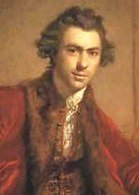To Jonathon Swift, Efq.
The D. of Bolton I hear hath run away with Polly Peachum, having settled 400£ a year upon her during pleasure, & upon disagreement 200£ a year.
John Gay
 The first actress to play Polly Peachum, innocent lover of highway-man Macheath in Gay's Beggar's Opera, was Lavinia Fenton.
The first actress to play Polly Peachum, innocent lover of highway-man Macheath in Gay's Beggar's Opera, was Lavinia Fenton.The play - arguably the greatest hit of the 18th century stage - had been rejected by Colley Cibber for Drury Lane as being too expensive and too bizarre to be a success; though when it proved to be a hit he was later to stage it there.
It therefore received its first staging at Lincoln’s Inn Fields on 29 January 1728, where it was described as 'A Newgate Pastoral, among Whores and Thieves.'
The Duke of Bolton first attended the play in April, though he was to become a regular visitor, night after night, having been very taken by the young actress playing Polly. He even brought his wife to a performance. He only stopped attending on June 22, when Lavinia's name was removed from the playbill.
The reason for her disappearance from the cast was that the Duke had persuaded her to become his mistress, on the generous terms specified by Gay in the letter above. This she was happily for the next twenty-three years until, on the death of his wife, the Duke married her, making her his Duchess.




















